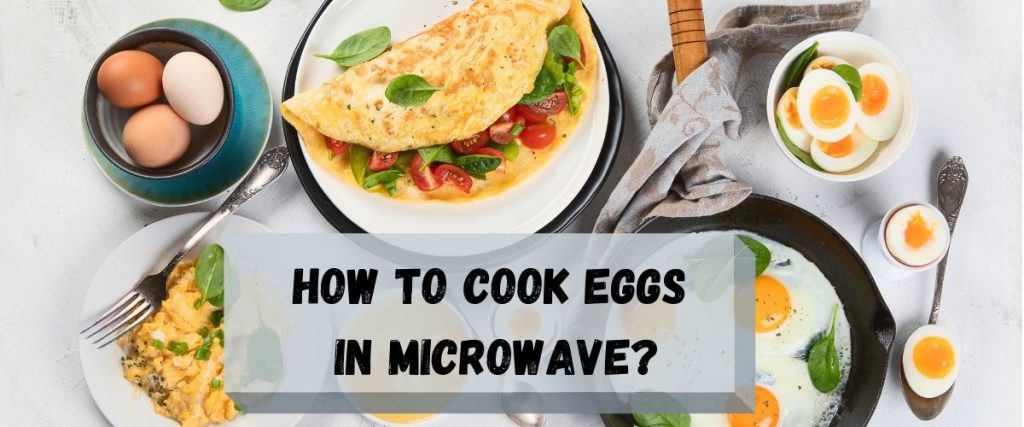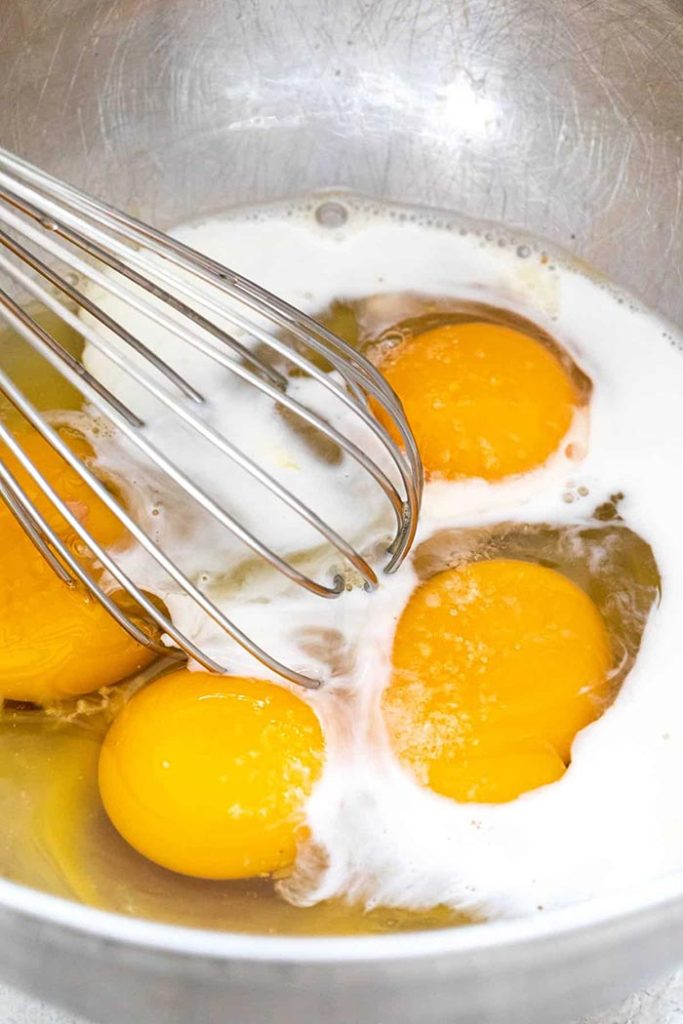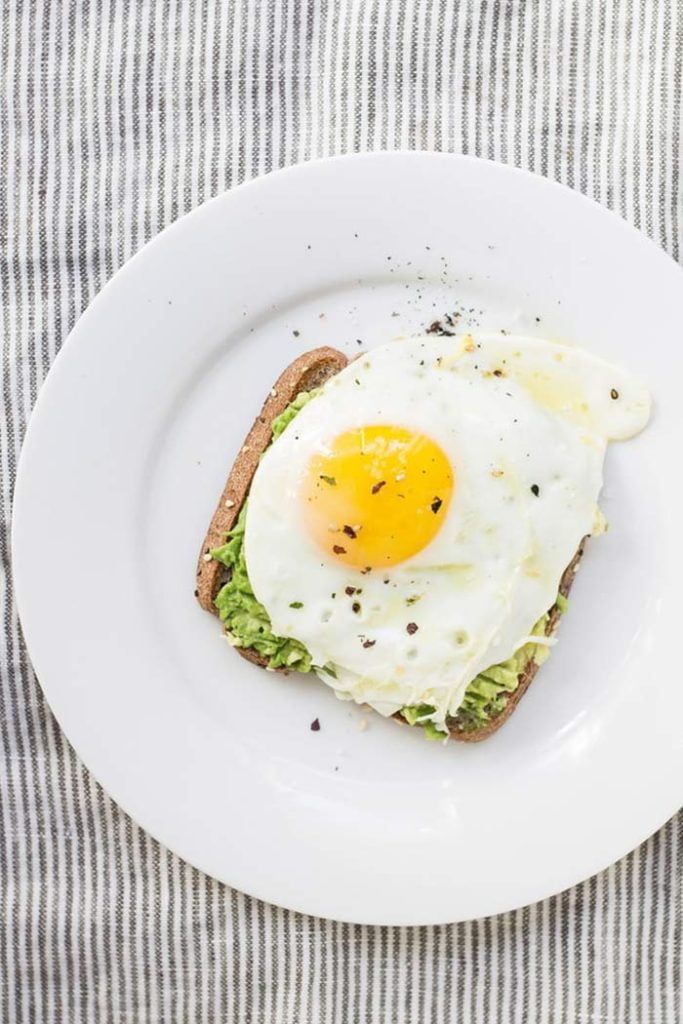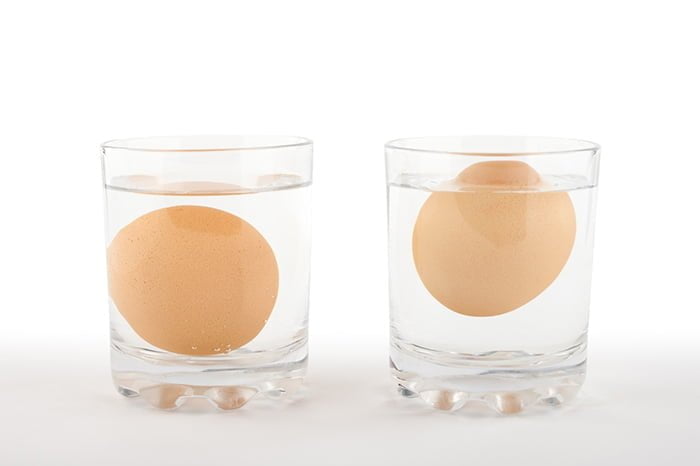
How To Cook Eggs In Microwave – Cooking Guide & Tips
Eggs are a versatile ingredient that can be cooked in a variety of ways. Are you looking for a quick and easy breakfast recipe? If so, then you should try cooking eggs in the microwave. Microwave eggs are a quick and easy option for those who are short on time.
In this blog post, we will share some different recipes for microwaved eggs. We will also provide tips on how to cook eggs in microwave safely and correctly. So, whether you are a beginner or an expert at cooking eggs in the microwave, we have something for you!
Can You Cook Eggs In The Microwave
You may be wondering that Can you cook eggs in the microwave, the answer is Yes! You can cook eggs in the microwave.

However, there are a few things that you need to know before you get started.
1) Make sure that the egg is fresh. If it’s not, the yolk will be tough and rubbery.
2) It is important to use a microwave-safe dish when cooking eggs in the microwave. If you do not have a microwave-safe dish, then you can use a ceramic mug or bowl. Just make sure that the dish is big enough to fit the egg without it touching the sides.
3) Keep in mind is that microwaves vary in power. This means that some microwaves will cook eggs faster than others.
As a general rule of thumb, it takes about 45 seconds to cook one egg in the microwave. But, we recommend checking on your eggs after 30 seconds to make sure they are cooking the way you want them to.
4) Don’t forget to prick the yolk with a fork before cooking; otherwise, it will explode as well.
Cook on high for about 30 seconds; the time will vary depending on the wattage of your microwave. Be careful when removing the hot bowl or ramekin from the microwave, as the contents will be very hot.
5) If you want to get fancy, you can add a bit of milk, cheese, and/or ham to the bowl before cooking the egg. This will make a sort of omelet in the microwave. Just be sure to scramble the egg first before adding any mix-ins.

With a little practice, you’ll be able to perfect your microwave eggs and have them exactly the way you like them. Bon appetit!
Now that you know how to cook eggs in microwave, let’s move on to the recipes!
How To Cook Eggs In Microwave
There are a few things to keep in mind when cooking eggs in the microwave.
1) It is important to use a microwave-safe dish.
2) Make sure the eggs are covered with water.
3) Cook the eggs on high power for about 30 seconds, then turn off the microwave and let the eggs sit for another minute before removing them from the dish.
Here are some recipes for how to cook eggs in microwave:
Recipe 1: Scrambled Eggs
This is a basic recipe for scrambled eggs. You can add whatever mix-ins you like, such as cheese, ham, or vegetables.

Ingredients:
- 2 eggs
- 1 tablespoon milk
- Salt and pepper to taste
Instructions:
1. Crack the eggs into a microwave-safe bowl or mug.
2. Add the milk and whisk together until the eggs are well beaten.
3. Season with salt and pepper, then stir once more.
4. Place the bowl or mug in the microwave and cook for 45 seconds to 1 minute, or until the eggs are cooked to your liking.
5. Enjoy!
What to Serve:
Scrambled eggs are typically served with toast, but you can also enjoy them with a side of fruit or roasted potatoes.
Nutrition Information:
- Calories: 190
- Protein: 14 grams
- Fat: 13 grams
- Carbs: 2 grams
- Fiber: 0 grams
- Sugar: 1 gram
Recipe 2: Microwave Egg Omelet
If you want something a little more substantial, then you should try this recipe for a microwave egg omelet. Just be sure to add the fillings after the egg has been cooked, otherwise, they will be overcooked.

This omelet is packed with protein and makes a great breakfast or post-workout meal.
Ingredients:
- 1 egg
- 2 tablespoons milk
- Salt and pepper to taste
- 1/4 cup shredded cheese
- 2 tablespoons diced ham
Instructions:
1. In a microwave-safe bowl or mug, whisk together the egg and milk.
2. Season with salt and pepper, then stir in the shredded cheese and diced ham.
3. Microwave for 1 minute to 1 minute 30 seconds, or until the egg is cooked through.
4. Enjoy!
What to Serve:
Serve this omelet with a side of toast or roasted potatoes.
Nutrition Information:
- Calories: 220
- Protein: 17 grams
- Fat: 15 grams
- Carbs: 2 grams
- Fiber: 0 grams
- Sugar: 1 gram
Recipe 3: Poached Egg
Poached eggs are a great option if you want a protein-rich breakfast without all the fat. This recipe is simple and only requires a few ingredients.

Poached eggs are a healthy option as they are cooked without the use of oil or butter. To cook poached eggs in the microwave, you will need:
Ingredients:
- 1 egg
- 1 tablespoon white vinegar
Instructions:
1. Fill a microwave-safe bowl or mug with water and add the vinegar.
2. Carefully crack the egg into the water.
3. Microwave for 1 minute to 1 minute 30 seconds, or until the egg is cooked to your liking.
4. Remove the egg from the water with a slotted spoon and enjoy!
What to Serve:
Poached eggs are typically served on toast with hollandaise sauce, but you can also enjoy them with roasted vegetables or potatoes.
Nutrition Information:
- Calories: 80
- Protein: 6 grams
- Fat: 5 grams
- Carbs: 1 gram
- Fiber: 0 grams
- Sugar: 0 grams
Recipe 4: Fried Eggs
Fried eggs are a classic breakfast food and they are surprisingly easy to make in the microwave. All you need is a little oil and a microwave-safe dish.
Ingredients:
- 1 egg
- 1 tablespoon vegetable oil
- Salt and pepper to taste
Instructions:
1. Crack the egg into a microwave-safe bowl or mug.
2. Add the oil and whisk together until the egg is well coated.
3. Season with salt and pepper, then stir once more.
4. Microwave for 45 seconds to 1 minute, or until the egg is cooked to your liking.
5. Enjoy!
What to Serve:
Fried eggs are typically served with toast, but you can also enjoy them with roasted potatoes or a side of fruit.

Nutrition Information:
- Calories: 190
- Protein: 14 grams
- Fat: 13 grams
- Carbs: 2 grams
- Fiber: 0 grams
- Sugar: 1 gram
As you can see, there are many different ways on how to cook eggs in microwave. With a little practice, you’ll be able to perfect your microwave eggs and have them exactly the way you like them. Bon appetit!
Whether you are a busy parent trying to get breakfast on the table in a hurry, or someone who just doesn’t enjoy cooking eggs on the stovetop, learning how to cook eggs in microwave is a valuable skill. These microwave eggs recipes will have you making perfect eggs every time, with little effort required. Give them a try today!
How Long To Cook Egg In Microwave
Now that you can answer the question of can you cook eggs in the microwave, as well as know how to cook eggs in microwave, so, how long to cook egg in microwave perfectly and safely?
The time it takes to cook an egg in the microwave depends on the method you are using and how you like your eggs.
- For scrambled eggs, it usually takes between 1 and 2 minutes.
- For poached eggs, it generally takes 1 to 1 1/2 minutes.
- For fried eggs, it typically takes 45 seconds to 1 minute.
- For runny yolks, cook the eggs for 45 seconds to 1 minute.
- And for firm yolks, cook the eggs for 1 to 2 minutes.
Keep in mind that these are general guidelines and your actual cooking times may vary depending on your microwave and the size of your eggs. It’s always best to start with less time and then add more if needed.
In addition, the type of dish you use to cook your eggs can also affect the cooking time. Glass or ceramic dishes tend to take longer than plastic or metal ones.
Microwave power also plays a role in how long it takes to cook eggs. Higher wattage microwaves will cook food faster than lower wattage ones.
If you are using a lower wattage microwave, you may need to increase the cooking time by 30 seconds to 1 minute.
To get the best results, it’s important to experiment and find the cooking times that work best for you and your microwave. With a little practice, you’ll be an egg-cooking pro in no time!
Tip & Trick on How To Cook Eggs In Microwave
Eggs are a healthy and versatile food that can be cooked in many different ways. Microwaving eggs is a quick and easy way to cook them, and it can be done with or without shells.
Here are some tips and tricks for cooking eggs in the microwave:
🔸 Use a microwavable safe dish such as a mug, ramekin, or bowl.
🔸 Spray your dish with cooking spray to help prevent sticking.
🔸 Crack your eggs into the dish and stir gently to combine the yolks and whites.
🔸 Add milk, cheese, vegetables, or meat to your eggs for extra flavor.
🔸 Cook on high power for 30-45 seconds, or until the eggs are cooked to your desired level of doneness.
🔸 Use a fork or spoon to scramble the eggs before cooking them. This will help them cook evenly.
🔸 Add some milk, cheese, or other ingredients to the eggs before cooking for a more flavorful dish.

🔸 Cook the eggs on 50% power to prevent them from overcooking or exploding.
🔸 Use a microwave-safe plate or bowl to cook the eggs in. Glass or ceramic dishes work well.
🔸 Cover the dish with a paper towel or lid while cooking to prevent splattering.
Cooking eggs in the microwave is a quick and easy way to make a healthy meal or snack. With these tips on how to cook eggs in microwave, you can cook eggs any way you like them – sunny-side up, scrambled, hard-boiled, or even poached. So why not give it a try?
Other Things Related To How To Cook Eggs In Microwave
The Benefits Of Eating Eggs
Eggs are a great source of protein, and they contain all the essential amino acids that our bodies need. They’re also low in calories, so they can help you lose weight or maintain a healthy weight.
Additionally, eggs are a good source of vitamins and minerals, including vitamin A, riboflavin, folate, and vitamin B12. Plus, they’re an excellent source of choline, which is important for brain health.
When it comes to nutrition, eggs are one of the most perfect foods. That’s why they’re often called “nature’s multivitamin”. Here are some of the nutrients eggs provide:
1) Protein: Eggs are an excellent source of protein. One large egg has six grams of protein, which is about 12% of the Daily Value (DV). Eggs are a complete protein, meaning they contain all the essential amino acids our bodies need.
2) Vitamins and minerals: Eggs are a good source of several vitamins and minerals, including vitamin A, riboflavin, folate, and vitamin B12. They’re also an excellent source of choline. Choline is important for brain development and memory function.
3) Fat: Eggs contain both saturated and unsaturated fats. The saturated fat in eggs is mostly found in the yolk, while the unsaturated fat is found in the egg white. The amount of fat in an egg depends on the size of the egg. A large egg has about five grams of fat, including 2 grams of saturated fat.
4) Cholesterol: One large egg has 186 mg of cholesterol, which is about 62% of the DV.
However, the cholesterol in eggs does not have a significant effect on blood cholesterol levels in most people. In fact, some studies have shown that eating eggs can actually improve “good” HDL cholesterol levels and lower “bad” LDL cholesterol levels.
Eating eggs can also help you lose weight. A study published in the journal Obesity found that people who ate two eggs for breakfast lost more weight than those who ate a bagel breakfast of equal calories.
Additionally, a study published in the journal Nutrition & Metabolism found that people who ate eggs for breakfast felt more satisfied and had less hunger throughout the day than those who ate a bagel breakfast.
So, there are many benefits to eating eggs. If you’re looking for nutrient-rich food that can help you lose weight, maintain a healthy weight, and provide you with vitamins, minerals, and protein, then eggs are a perfect choice.
How To Store Eggs
Eggs are a kitchen staple and one of the most versatile ingredients you can have on hand. But they can also be a bit tricky to store properly. Here are a few tips on how to store eggs so that they stay fresh and delicious.
First, always keep eggs in the refrigerator. Room temperature eggs are more likely to spoil and can cause food poisoning if eaten.
Second, place eggs in an egg carton or other container with the pointy end down. This helps prevent the yolks from breaking and keeps them fresh for longer.

Eggs should be stored in the refrigerator, in their original carton. The carton helps to keep the eggs fresh and prevents them from picking up odors from other foods.
Third, if you’re not going to use all the eggs in a carton right away, write the date on the carton so you know when they need to be used. Eggs should be used within 3-5 days for best quality.
Fourth, if you find a cracked egg, don’t use it. Cracked eggs can spoil more quickly and are more likely to cause food poisoning.
And finally, if you’re not sure how long your eggs have been in the fridge, do the float test. Fill a bowl with cold water and gently place an egg in it. If the egg sinks to the bottom, it’s fresh. If it floats to the top, it’s time to toss it out.

If you need to store eggs for longer than that, you can store them in the freezer. However, frozen eggs should be used within one year.
To freeze eggs, crack them into a bowl or container and whisk them until the yolks and whites are combined. Then, pour the mixture into an ice cube tray and freeze for up to one year.
When you’re ready to use frozen eggs, thaw them overnight in the fridge. You can then use them in any recipe that calls for raw eggs.
If you have cooked eggs that you need to store, they can be stored in the fridge for up to four days. Cooked eggs can also be frozen, but they will only stay fresh for two to three months.
When it comes to cooking eggs, the microwave is a versatile kitchen appliance that can help you make a variety of recipes. Whether you’re looking for a quick and easy breakfast option or a hearty dinner dish, there’s a microwave egg recipe for you!
FAQs on How To Cook Eggs In Microwave
Is it bad to microwave eggs?
If you follow certain guidelines, microwaving eggs is perfectly safe. For example, you should always scramble the eggs before putting them in the microwave, and make sure to cook them all the way through.
Additionally, it’s best to use fresh eggs rather than older ones, as older eggs are more likely to contain bacteria that could cause food poisoning.
However, there are also some risks associated with microwaving eggs. If you don’t cook them properly, they can explode and cause burns or other injuries. Additionally, microwaving eggs can cause them to lose some of their nutritional value.
So, ultimately, the decision of whether or not to microwave eggs is up to you. If you’re careful and follow the proper guidelines, it’s perfectly safe. But if you’re worried about the risks, you may want to avoid microwaving them altogether.
How do you fry an egg in the microwave without it exploding?
How do you make a sunny side up egg in the microwave?
What is the healthiest way to cook an egg?
For example, boiled eggs are a healthy option because they’re low in calories and fat. However, they can also be difficult to digest and may contain harmful bacteria if not cooked properly.
On the other hand, scrambled eggs are a quick and easy option that’s packed with protein. But they’re also high in fat and calories, so they should be eaten in moderation.
Ultimately, the best way to cook an egg depends on your individual needs and preferences.
If you’re looking for a healthy option, boiled or poached eggs are a good choice. If you’re looking for a quick and easy option, scrambled eggs are a good choice. And if you’re looking for an egg that’s packed with protein, a sunny side up egg is a good choice.
How long do you cook an egg in the microwave?
When it comes to hard-boiled eggs, the cooking time will depend on how hard or soft you like your eggs. If you like your eggs firm, they only need to be cooked for about 3 minutes. If you like them softer, they’ll need to be cooked for about 5 minutes.
Ultimately, it’s up to you how long to cook egg in microwave. Just make sure to keep an eye on them so they don’t explode!
Can you microwave eggs in a paper bowl?
What is the fastest way to cook an egg?
Can you overcook an egg in the microwave?
Additionally, microwaving eggs can cause them to lose some of their nutritional value. So, it’s important to be careful and follow the proper guidelines when microwaving eggs.
How do you know when an egg is done in the microwave?
What happens if you microwave an egg without the shell?
Conclusion on How To Cook Eggs In Microwave
Whether you’re looking for a quick and easy breakfast on the go or are just trying to mix up your morning routine, microwaving eggs is a great option. Whether you are a seasoned chef or just starting out in the kitchen, learning how to cook eggs in microwave is a valuable skill.
And with so many different recipes out there, you can find one that fits your taste preferences perfectly. So what are you waiting for? Start microwaving those eggs! Have you tried any of the recipes we shared today? What’s your favorite way to cook eggs in the microwave? Let us know in the comments below.
We hope you enjoyed this blog post. If you have any questions or comments, please feel free to send us an email. We would love to hear from you!
Further reading
How To Boil Eggs In Microwave?
How To Make Oatmeal In The Microwave?



